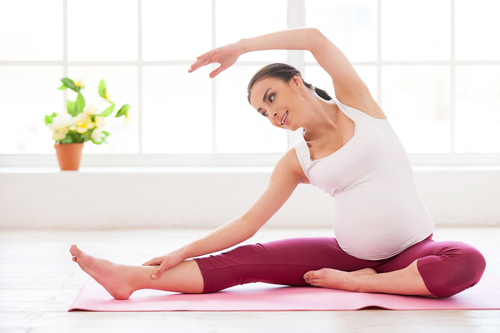
Photo: Shutterstock
Pregnancy can really take over a woman’s body – hormones, fatigue, nausea, water retention and back pain are just some of the not-so-great symptoms. It can be appealing to want to sit back, relax and wait the next nine months out on the couch. However, experts say that unless you have complications, getting exercise can actually benefit you throughout your pregnancy and with your delivery.
Benefits
Getting your body moving can help with body pain such as a back ache. Exercise releases endorphins – chemicals that trigger positive feelings – so you will be in a better mood. It’ll also help burn extra calories and keep your weight in check, build muscle and improve your stamina – useful for when you have a demanding newborn to deal with. You’ll be more likely to sleep well when you are physically tired. Other benefits linked to exercise during pregnancy include lowering the risk of developing gestational diabetes and pregnancy-related high blood pressure. It’s also linked with lowering the severity of postpartum depression.
Starting out
Always consult your doctor before starting out an exercise regime. It’s important to get the opinion of a professional who knows your medical history so that you are sure you are not under any risk from exercising. For example, those with heart or lung disease, high blood pressure or cervical problems may be instructed to avoid exercise.
Adjusting your pace
The amount and intensity of your exercise will depend on your medical history, your type of pregnancy and how much you are capable of doing. Those with a regular pre-pregnancy exercise schedule or an active lifestyle are likely to be able to exercise more than those who are usually sedentary. So start slow at first and build up. It’s recommended that pregnant women get at least 30 minutes of moderate exercise a day. Walking is a good way to start off. Swimming, cycling on a stationary bike and low-impact aerobics are also good choices that won’t put too much pressure on your joints. For more experienced exercisers, strength training is fine, but should be approached within limits and with caution.
Things to remember
If you aren’t used to exercising, start with just five minutes a day and build on that over time. Warming up and cooling down is extremely important. Carry water to sip at all times and don’t overexert. If you start to feel tired, breathless or dizzy, have a rapid heartbeat, chest pain or uterine contractions, stop immediately. Headache, vaginal bleeding or fluid leaking from your vagina are also warning signs to stop. Get medical attention if these symptoms persist.
Keeping at it
It’s easy to put off working out in favor of just lazing around. To keep motivated, think about what you like doing and include it in your workout. Listening to music, walking through a scenic park or having a friend keep you company are all great ways to push yourself forward.
Remember that pregnancy has a profound impact on your body so don’t be too hard on yourself if you seem to be lagging behind when compared with your usual pace. Listen to your body and let it rest adequately. Your ability to do more intense exercise will probably slow down as the months go by.
Share your thoughts, leave a comment below. Please like FamiLife’s page on Facebook so that you get all our articles and others may find us.
so that you get all our articles and others may find us.
